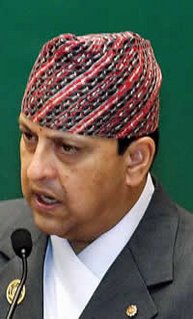 Hridayesh Tripathy, the senior-most Madhesi in the cabinet, steps down accusing the government of indifference to the conflagration in the Terai. And what does the government do to rebut him? It arrests Kamal Thapa and Badri Mandal, ministers in the royal regime.
Hridayesh Tripathy, the senior-most Madhesi in the cabinet, steps down accusing the government of indifference to the conflagration in the Terai. And what does the government do to rebut him? It arrests Kamal Thapa and Badri Mandal, ministers in the royal regime.No wonder, a week after Prime Minister Girija Prasad Koirala invited Madhesi leaders for talks on regional grievances fuelling the unrest, dialogue remains as elusive as ever.
The Seven-Party Alliance (SPA)’s doggedness in dismissing the violence in the Terai as a plot hatched by reactionary royalists to subvert the constituent assembly elections is disgraceful.
The Maoists are more defiant. At least, they have a reason. The Madhesi People’s Rights Forum, which is spearheading the movement, is led by a former Maoist, Upendra Yadav (pictured). For the former “People’s Warriors,” acknowledgment of those ethnic and regional grievances as genuine would undercut the principal success they claim their decade-long murder and mayhem achieved.
From Bedananda Jha to Gajendra Narayan Singh, the Madhesi movement has progressed in different ways. The former fulminated against, among other things, the imposition of a language that required parents to refer to sons with an honorific locally reserved for the father (babu). When it came to daughters, the new term of endearment (nani) stepped up a generation. Yet the Panchayat system co-opted Jha, who went on to head the Raj Sabha as well as serve as Nepal’s ambassador to, yes, India.
Singh’s movement grew out of Harka Gurung’s population report toward the final years of the Panchayat regime. His plea for the recognition of Hindi and the regional attire inside the Rastriya Panchayat symbolized the region’s quest for inclusion. With homogeneity the order of the day, Singh’s approach to promoting goodwill was a non-starter.
Following the restoration of multiparty democracy in 1990, Singh renamed his organization into a full-fledged party. Nepal Sadbhavana Party could surmount the strict constitutional provisions on political parties whereas many northern nationalities found themselves disqualified for their purported “communalism.”
Yet it was hardly smooth sailing for the NSP. The Madhesis had been coopted once again by a constitution whose principal architect, Bishwanath Upadhyaya, took great pride in having rubbished 90 percent of the public’s recommendations. (Yes, he actually said the country could not afford to get entangled in demands for ethnic, regional and linguistic autonomy.)
When Kathmandu erupted in violent frenzy in late 2000 over slurs falsely attributed to a top Indian actor, Singh’s party offices in the capital were vandalized. In the final months of his life, Singh must have been tempted to rubbish any direct correlation between partylessness and an exclusionary state.
This time, things are different. The blogosphere is full of anti-pahadi rants for, among other things, the tendency to discredit the movement as part of a royalist plot. The demolitions of statues and B.P. Koirala and Ganesh Man Singh, along with the ransacking of UML general secretary Madhav Kumar Nepal’s home, underscores the seriousness of the crisis.
Admittedly, the SPA and the Maoists find it difficult to accuse India’s Hindu nationalist Bharatiya Janata Party for fomenting the unrest to restore Nepal’s Hindu identity. After all, it hasn’t been a year since unfamiliar multitudes drove “Jana Andolan II” and gave what the SPA and the Maoists consider an “historic” mandate in perpetuity.
The state and Madhesis are operating in different universes. The SPA-Maoist combine wants the movement to let the constituent assembly institutionalize Nepalis’ hard-won gains first. The movement rejects that premise by challenging the representation envisaged by the interim constitution. Thapa’s and Mandal’s arrests are just another snub to the movement.
Prime Minister Koirala is probably sympathetic to the movement. He might genuinely consider himself a Madhesi, given the Koirala clan’s roots in Morang. Moreover, the prime minister’s electoral constituency has never left the greater Sunsari-Morang belt.
The real issue, though, is whether madhesis consider him one of their own.
Might they were Upendra Yadav to win a seat in the constituent assembly from, say, Taplejung under a revised interim statute? Cooption is not an option, this time.



